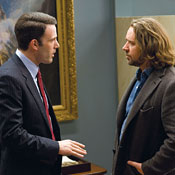- REVIEW
- READER REVIEWS
State of Play
|
(No longer in theaters)
|
|
Genre
Drama
Producer
Tim Bevan
Distributor
Universal Pictures
Release Date
Apr 17, 2009
Release Notes
Nationwide
Official Website
Review
In the taut American remake of the British mini-series State of Play, director Kevin Macdonald hints early and often at a vast conspiracy underlying the seemingly unrelated deaths of a junkie-thief and the mistress of a hotshot U.S. congressman (Ben Affleck)�one that emanates from the most powerful sphere of the military-industrial complex. The journalists digging into the story (Russell Crowe and Rachel McAdams) are photographed through windows or from high above, while in the background loom national icons (the Washington Monument, the Capitol) in silent rebuke of perverted American ideals. It’s gripping stuff�very Alan Pakula, very All the President’s Men�and Crowe’s restless energy (he can’t stay put even long enough to wash his straggly hair) gives the convoluted plot an edgy momentum. The problem�and I’ll endeavor not to spoil anything�is the resolution. It’s tricky, it’s surprising, and it’s largely faithful to the original mini-series, but in context it’s a nonevent. It’s like a time bomb that’s never dismantled but never explodes. The movie is good enough that the ending leaves you � not angry, exactly. Unfulfilled.
Before I continue, you’re probably sick of critics going on about adaptations that fall short of their sources. Chances are you don’t know the original and don’t much care about changes; the question is, �Does the remake work on its own terms?� But when a new film doesn’t click (and most Hollywood remakes of foreign movies are duds), it helps to know what its makers were aiming to reproduce. In this case, Paul Abbott’s six-hour mini-series was a close look at two machines�one journalistic, one governmental�and the individuals chewed up in their gears. It was also a paranoid conspiracy thriller (and a nail-biter), but you sensed that it wouldn’t come down to a chase or gun battle, that the answers would be in the characters’ faces, in secrets even the closest of friends couldn’t detect. The new script (credited to Matthew Michael Carnahan, Tony Gilroy, and Billy Ray) is a stew of topical headlines: the unchecked power of a Blackwater-like security firm, the financial peril of daily newspapers, the rise of gossipy bloggers. The allusions add punch and the Pakula-esque red herrings ratchet up the suspense, but it’s all essentially beside the point.
The point is blunted, anyway, because the new State of Play is a study in stars’ noncombustion. Driven investigative reporter Cal McAffrey (Crowe) and driven U.S. congressman Stephen Collins were college roommates turned reluctant adversaries; now, after someone pitches the politician’s mistress under a D.C. metro train, they’re uneasy allies. Their relationship should be the core of the movie. But Crowe and Affleck don’t fit onscreen�they don’t inhabit the same existential space. Crowe is a transformer�his actor’s DNA changes in every role�and you feel McAffrey’s febrile mind racing to resolve his conflicting loyalties. Whereas Affleck is, as always, Lumpy Ben: slack-jawed, dopey, not quite broken in. He might be smart and thoughtful in life and Crowe a Cro-Magnon, but as an actor his wheels turn too slowly to keep up. At least Affleck is temperamentally suited to the part�that opaque, conventionally good-looking, Al Gore�ish effect is the reason, we infer, that Collins went into politics. And he keeps you off-balance: Is it Affleck or Collins who’s the bad actor? Or is it both?
While we wonder, Macdonald keeps the characters in motion: Why should anyone converse sitting down when they could be striding briskly down hallways? Until the botched climax, the movie flies along, with excellent actors bobbing in and out. It was a neat idea to make McAdams’s character a cheeky Capitol Hill blogger and, as such, an affront to McAffrey’s journalistic scruples. (Too bad that after a confrontational start she settles into the role of sidekick and apparently stops blogging�she doesn’t even moan about the pressure of having to post.) Robin Wright Penn brings amazing depth of emotion to Collins’s wife, with whom McAffrey once had an affair. Pissed off, humiliated, she allows herself no extraneous gestures�all her effort is channeled into holding herself together. (She recalls poor Silda Spitzer standing by her man.) As the editor of the �Washington Globe,� Helen Mirren is perfection. Watch how abruptly she shifts from solicitous to conspiratorially chummy to sharp and imperious�anything to get what she needs from her reporters, and thereby keep her endangered newspaper afloat. At some point I began to see her as the guiding spirit of this State of Play, standing in for producers with a studio breathing down their necks: Let’s take this cerebral British mini-series and spice it up without making it too tabloid, and let’s bring it in under two hours!
